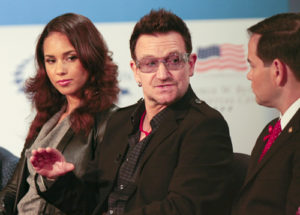See more photos from the event
President Barack Obama joined activists, celebrities and politicians Thursday to announce $50 million of new funding for domestic HIV/AIDS treatment.
Obama received a standing ovation when he announced an expansion of global treatment goals, up from 4 million people by the end of 2013 to 6 million.
“Today we come together as a global community across continents, across faiths and cultures, to renew our commitment to ending the AIDS pandemic once and for all,” Obama said.
A panel discussion followed with singers Bono and Alicia Keys, Sen. Marco Rubio, R-Fla., Rep. Barbara Lee, D-Calif., and activists. The conversation was moderated by Sanjay Gupta, CNN’s chief medical correspondent.
Former presidents George W. Bush and Bill Clinton as well as musician Elton John and President of Tanzania Jakaya Kikwete joined the conference via satellite.
The event, dubbed “The beginning of the end of AIDS,” marked the 23rd anniversary of World AIDS Day. Since its discovery in the early 1980s, an estimated 30 million people have died from the disease worldwide.
The president called for programs to reduce transmission of HIV/AIDS among minority Americans, about 1.2 million of whom are estimated to live with the disease.
Obama also praised the bipartisan support of HIV/AIDS treatment initiatives in Congress and called on China and other countries to “step up as major donors” to the Global Fund to Fight AIDS, Tuberculosis and Malaria.
“In a time when so much in Washington divides us, the fight against this disease has united us across parties and across presidents, and shows that we can do big things when Republicans and Democrats put their common humanity before politics,” he said.
Obama’s pledge adds $15 million to Ryan White treatment programs nationwide and $35 million to state-run HIV/AIDS programs.
Eradicating AIDS is a goal that “allows us to stand at that most perfect union of audacity and achievability,” Gupta said at the event sponsored by advocacy organizations ONE and (RED).
Obama praised his predecessor for “bold leadership” in the field, including the establishment of the President’s Emergency Plan for AIDS Relief, which works to provide treatment to sufferers of the disease worldwide.
Bush gave brief remarks from Dar es Salaam, Tanzania – a place he called he “frontline of the battle” against HIV/AIDS.
“There’s no greater priority than living out the admonition, ‘to whom much is given, much is required,’” Bush said, urging the country to support HIV/AIDS programs.
The 43rd president will announce a new George W. Bush Presidential Center “Pink Ribbon/Red Ribbon” campaign to fight breast and cervical cancer in tandem with its AIDS programs tomorrow in Zambia.
“It is not acceptable to save a woman from AIDS and watch her die from cancer,” he said.

Politicians from either side of the aisle advocated for further investments in HIV/AIDS prevention and treatment, despite global economic hardship.
Clinton emphasized the importance of using foreign aid funding efficiently and encouraged activists to focus on raising more money for the cause.
“The economy will be even tougher if people around the world are dying and can’t enter the workforce and can’t be our business partners in economic trade and development,” Rubio said, to cheers from the audience.
Kikwete thanked U.S. leaders for pioneering the efforts against the disease but, like others, acknowledged there is still work to be done.
“The disease has spread like a bush fire in the Harmattan winds to every corner of our country,” he said. In the last year, 86,000 Tanzanians have died from the disease. Kikwete estimated that 1.3 million people live with HIV/AIDS in the eastern African country.
“I’m not happy with the last statistics, but we’re steadily on the march to do better,” Kikwete said. “Now the disease is no longer the death sentence it used to be.”
University President Steven Knapp welcomed the speakers to the Jack Morton Auditorium, the walls of which were decked with swatches of the commemorative AIDS quilt.
“GW is proud to perform its role in the battle against HIV and AIDS, both globally and right here in the District of Columbia,” Knapp said, noting University collaborations with the National Institutes of Health, the D.C. Department of Health, and the Centers for Disease Control and Prevention.
Bono and Alicia Keys, both of whom were inspired to become advocates for HIV/AIDS during trips to Africa, emphasized eliminating the disease entirely.
“I’m 30. This disease is 30 years old. When my son is 30, we must make it that he won’t even know about this. He’ll know that it was in the past and that now we have created the end of it,” Keys said. “So if we have the power to, then we must.”




